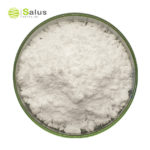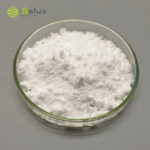
86-29-63699260 / +86-137-5995-3739

Sale@salusnutra.com


Product Name: L-Carnosine
CAS Number: 305-84-0
EINECS No: 206-169-9
Empirical Formula (Hill Notation): C9H14N4O3
Specification:99% By HPLC
Package:25Kg/Drum
Drum’s Size:36cm*36cm*52cm
Shelf Time:2 Years
Description
L Carnosine (beta-alanyl-L-histidine) is a dipeptide of the amino acids beta-alanine and histidine. It is highly concentrated in muscle and brain tissues.
l Carnosine and carnitine were discovered by Russian chemist V.Gulevich.Researchers in Britain,South Korea,Russiaand other countries have shown that carnosine has a number of antioxidant properties that may be beneficial. Carnosine has been proven to scavenge reactive oxygen species (ROS) as well as alpha-beta unsaturatedaldehydes formed from peroxidation of cell membrane fatty acids during oxidative stress. Carnosine is also a zwitterion, a neutral molecule with a positive and negative end.Like carnitine, carnosine is composed of the root word carn, meaning flesh, alluding to its prevalence in animal protein. A vegetarian (especially vegan) diet is deficient in adequate carnosine, compared to levels found in a standard diet.
Specification
|
Product Name: |
L-Carnosine |
Cas No.: |
305-84-0 |
|
EINECS: |
206-169-9 |
Molecular formula: |
C9H14N4O3 |
|
Item of Analysis |
Specification |
|
Identification |
Consistent with the reference substance main peak retention time |
|
Color |
White to Off-white |
|
Specific rotation [α]D20 |
+20.0°to +22.0° |
|
Heavy metals |
≤ 10ppm |
|
pH |
7.5 to 8.5 |
|
Loss on drying |
≤ 1.0% |
|
Residue on ignition |
≤ 0.10% |
|
Lead |
≤ 3ppm |
|
Arsenic |
≤ 1ppm |
|
Mercury |
≤ 0.1ppm |
|
Cadmium |
≤ 1ppm |
|
Melting point |
250.0℃ to 265.0℃ |
|
Hydrazine |
≤ 2ppm |
|
L-Histidine |
≤ 0.3% |
|
Assay |
99.0% to 101.0% |
|
Total aerobes counts |
≤ 1000cfu/g |
|
Yeast and Mould |
≤ 100cfu/g |
|
E.Coli |
Negative |
|
Salmonella |
Negative |
As a 2018 review on carnosine reports, there’s great potential for the application of carnosine in health and disease.1 For instance, it’s been discovered that carnosine has powerful antioxidant properties, allowing it to protect cells against free radical damage. It also appears to reduce inflammation, a driver of many types of chronic disease.
Due to these effects, it’s thought that carnosine could help protect against a number of aging-related conditions, such as Alzheimer’s disease and cardiovascular disease. That said, very few clinical trials have tested the potential health benefits of taking carnosine supplements. Until such trials are conducted, it’s difficult to tell how the consumption of carnosine might influence human health.
Here’s a look at some of the more promising research on carnosine.
Alzheimer’s Disease
Animal and laboratory studies show that carnosine reduces the buildup of amyloid beta, the protein that forms the brain plaques associated with Alzheimer’s disease.
In one study on mice published in 2013, oral supplementation with carnosine prevented cognitive decline due to its inhibition of amyloid beta.
In 2016 research on healthy elderly people that supplemented with a formula containing carnosine, scientists reported an improvement in the decrease in blood flow to the brain that occurs in Alzheimer’s disease, as well as better preservation of memory in the participants.3 Similar results were shown in an animal model of Alzheimer’s disease published in 2017.4
In light of this evidence, carnosine has been postulated to control the progression of Alzheimer’s disease; clinical studies, however, are still needed.
Diabetes
Carnosine may be especially beneficial to people with diabetes in that it can protect against damage caused by protein glycation. This process, which results from having too much sugar in the body, is a major contributor to diabetes-related complications, such as kidney and nerve damage.
Although evidence is still emerging, both animal and human studies have indicated the potential of supplementation with carnosine (which is diminished in both animals and humans with type 2 diabetes) to delay the progression of diabetes and prevent such complications.
A pilot clinical trial provided evidence of the ability of carnosine supplementation to protect against diabetes development in non-diabetic obese individuals.6 When overweight and obese adults were randomly assigned to ingest either carnosine (two grams a day) or a placebo for 12 weeks, an increase in fasting insulin and insulin resistance was reported with placebo, but not carnosine. The group receiving carnosine also had improved responses to an oral glucose test (for example, lower glucose and insulin).
Such findings, although promising, require further confirmation.
Cancer
A number of preliminary (cell culture) studies suggest there is potential for carnosine to help fight cancer.7 For instance, the presence of carnosine decreased growth on many major types of cancer cells, including liver cells, colon cells, and ovarian cells. There’s also evidence from studies that correlates low levels of carnosine or high levels of activity of carnosidase, the enzyme that breaks down carnosine, and poor cancer prognosis.
While interesting, it’s important to remember that this esearch is in its infancy.
Autism
One of the few clinical trials involving carnosine is a small study published in the Journal of Child Neurology in 2002.9 In it, 31 children with autistic spectrum disorders took either a carnosine supplement or a placebo every day for eight weeks. By the end of the treatment period, members of the carnosine group showed significantly greater improvements in certain measures of functioning, including behavior and communication.
The study’s authors note that carnosine may benefit children with autism by enhancing nervous-system function. Despite these promising results, no more recent research on carnosine and autism has been conducted.

Send Message +
© 2021 www.salusnutra.com All Rights Reserve